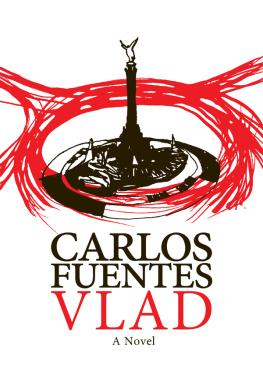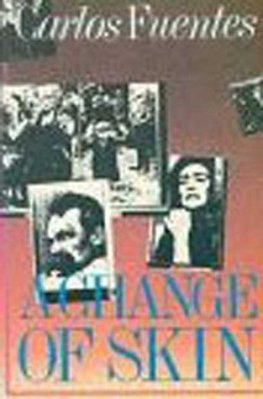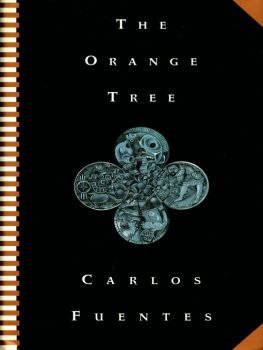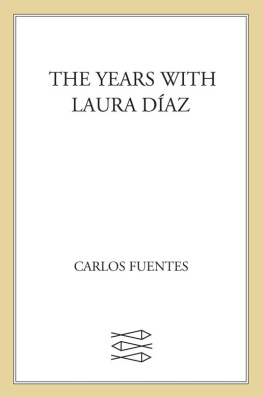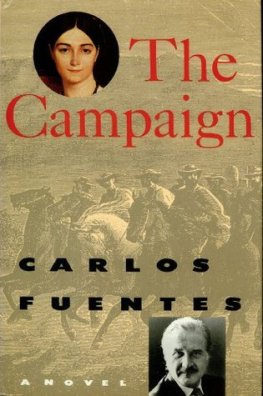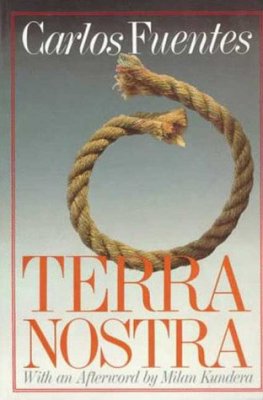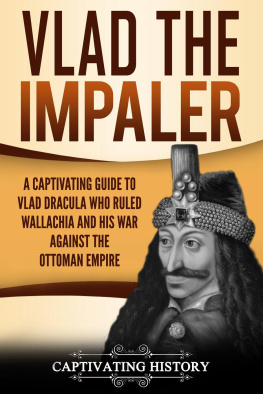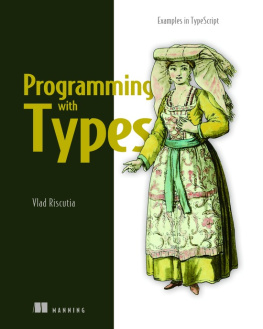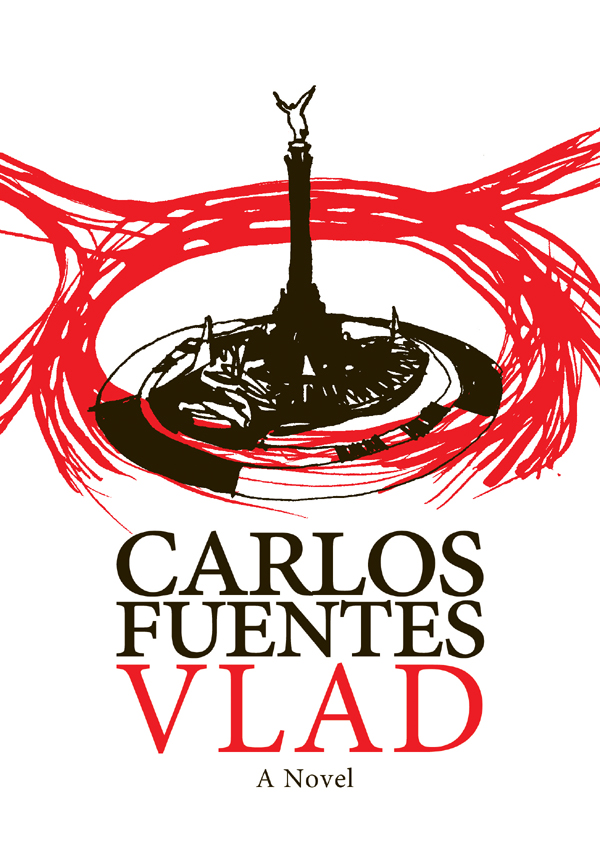
VLAD
CARLOS FUENTES
T R A N S L A T E D B Y
E. SHASKAN BUMAS AND
ALEJANDRO BRANGER

Contents
Where the Air is Clear
Aura
The Good Conscience
The Death of Artemio Cruz
A Change of Skin
Holy Place
Terra Nostra
The Hydra Head
Burnt Water
Distant Relations
The Old Gringo
Christopher Unborn
Myself with Others
The Buried Mirror: Reflections on Spain and the New World
The Campaign
The Orange Tree
Diana: The Goddess Who Hunts Alone
A New Time for Mexico
The Crystal Frontier: A Novel in Nine Stories
The Years with Laura Daz
Inez
This I Believe: An A to Z of a Life
The Eagles Throne
Happy Families
Destiny and Desire
To Cecilia, Rodrigo, and Gonzalo,
the child monsterologists of Sarria
Go to sleep, my girl,
here comes the coyote;
coming to get you
with a great garrote
Mexican lullaby
I wouldnt trouble you, Navarro, if Dvila and Uriarte were available. Im not going to call them your inferiors subordinates sounds betterbut neither will I forget that you are a senior partner, primus inter pares , and so are higher ranked in this firm. I am entrusting this task to you because, first and foremost, I consider this a matter of utmost urgency...
Weeks later, when the awful adventure had ended, I recalled that, at its beginning, I had chalked up the absence of Dvila and Uriarte to luck. Dvila was off on his honeymoon in Europe, and Uriarte was tied up in a judicial embargo. As for me, I was neither going away on a wedding trip, nor would I have ordinarily accepted the work, appropriate for a lawyer just out of school, that our boss had delegated to our indefatigable Uriarte.
But I respected the decision of my elderly employer and appreciated the meaningful intimacy of his trust. He had always been an uncompromising man whose decisions were final. He was not in the habit of asking anyone for advice. Although he was tactful enough to listen attentively to his co-workers points of view, he replied with orders. And yet, in spite of what I just said, how could I ignore the peculiar circumstances by which hed acquired his fortune? His status as a rich man was recent enough for him still to be considered new money, but even that new money, thanks to the gravitas of its owner, felt every bit as old as his eighty-nine years and tied to the history of an already buried century. His wealth was largely a result of the obsequiousness (or the moral flexibility) with which he had served (and risen in his service of) successive governmental administrations during his long years in Mexico. Suffice it to say he was an influential man.
I must confess that I never saw my boss behave submissively to anyone. I could only guess at the inevitable concessions that his haughty gaze and already curved spine had been forced to makeover the course of his careerto politicians who could hardly be said to exist at all beyond the six-year span of a presidents term. He knew perfectly well that political power was fleeting; the officials did not. They prided themselves on having been named ministers for six years, after which they would be forgotten for the rest of their lives; whereas the admirable thing about the distinguished Don Eloy Zurinaga, Esq., was that for sixty years he had known how to slither from one presidential administration to the next while always landing on his feet. His strategy was quite simple. Throughout his career, he never fell out with politicians because he never once let them glimpse the inevitability of their political greatness dwindling to a future of insignificance. Few saw past the superficial courtesy and empty praise of Eloy Zurinagas ironic smile.
As for his attitude toward me, I quickly accepted that if it did not behoove him to display any new loyalties, this was because he never demonstrated any lasting affection to anyone or to anything. That is, his official conduct was professional: honest and efficient. It can only remain a matter of conjecture whether that honesty was genuine and that efficiency just a type of tyranny, and whether both qualities combined into a mask necessary for survival in the swamp of political and judicial corruption. If Licenciado Zurinaga never quarreled with a government official, that was probably because hed never much liked any of them. He didnt need to say this. His life, his career, even his dignity confirmed it.
A year had passed since Mr. Zurinaga, my boss, had become housebound. In all that time, nobody at the firm ever dared imagine that the physical absence of the man in charge allowed for slack behavior, tardiness, or idle jokes. On the contrary, in his absence, Zurinaga felt all the more present. He seemed to have issued a warning: Be careful. At any moment I might show up and surprise you. Watch out.
More than once during the past year, Mr. Zurinaga had telephoned to announce his imminent arrival in the office. Although he never showed up, on each occasion a holy terror put the entire staff on high alert, leaving us all on our best behavior. And then, one morning, an individual who seemed identical to the boss came into, and a half hour later left, the office. The only reason we knew it wasnt really him was that in the course of that half hour, Mr. Zurinaga telephoned a few times to issue instructions. On the phone that morning, he spoke in a decisive, almost dictatorial way, without entertaining a single question, remark, or response. Then, without allowing for so much as an acknowledgment, he hung up. Word spread that the individual in the office couldnt be the boss after all, and yet, when he walked out, seen from behind, he was tall and stooped over, just like the absent lawyer. He was dressed in an old polo coat with its lapels lifted to his ears and a totally out-of-fashion black-and-brown felt hat from which two uncontrolled white tufts of hair burst like the wings of a bird.
The walk, the cough, and the clothing were all the bosss, but this visitor, who entered the sancta sanctorum of the office with such nonchalance that nobody stopped him, was not Eloy Zurinaga. The jokeif it even was a jokedidnt leave any of us laughing. Quite the opposite. The appearance of this double, specter, or look-alikewhatever he wasonly made us feel unease and anxiety.
Because he no longer came into the office, my meetings with the lawyer Eloy Zurinaga, my boss, took place at his home. From the street, a skimpy and miserable garden led to an equally miserable, collapsing set of stairs to the great house. He lived in one of the last remaining Porfirian mansions, as theyre called, in reference to the dictatorship of General Porfirio Daz, specifically the period from 1884 to 1910, our pretend belle poque. For some unknown reason, no one had torn down the mansion, unlike the rest of the Roma neighborhood of Mexico City, which has been razed to make way for office buildings, condominiums, and shops. One needed only enter the large, ramshackle two-storied house, crowned with a mansard roof and atop an inaccessible cellar, to understand that the lawyers entrenchment was not a matter of will so much as one of gravity. Zurinaga had accumulated so many papers, books, case files, pieces of furniture, bibelots, dishes, paintings, rugs, tapestries, folding screens, and especially memories in that residence that to change locations would have been for him like changing his life and accepting, even hastening, his death.
To demolish the house would be to demolish his entire existence.
Next page
